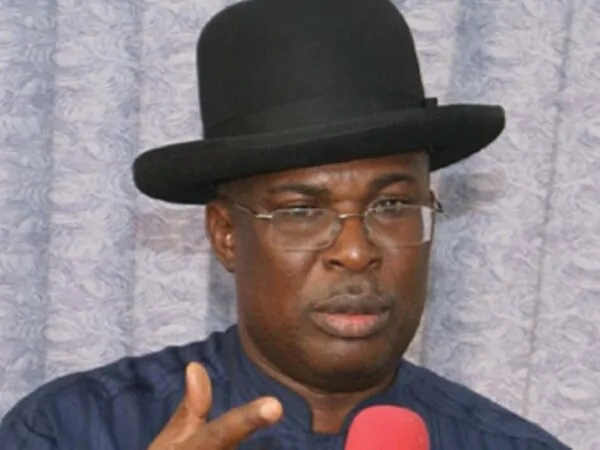The Federal Government has said but for the continuous retention of subsidy, petrol should have been selling now at N183 per litre.
The Minister of State for Petroleum Resources, Timipre Sylva, said this on Tuesday at the meeting between the Federal Government and Organised Labour over the recent increase in the cost of petrol and electricity tariffs.
Organised Labour had threatened to embark on strike from September 23, 2020 of the Federal Government does not reverse the increases, with fuel now selling between N160 and N165.
However, contrary to the earlier position that the Federal Government was no longer subsidising petroleum products, Sylva said this was not so.

He said the Federal Government was still subsidising petrol.
He told the meeting that government spent N10.4 trillion on petrol subsidy between 2016 and 2019.
He also said the country lost N1 billion daily to fuel subsidy between 2016 and 2019, adding that the country was in bad shape now because of the crash of crude oil price globally.
Sylva said: “We have not fully deregulated because of the concerns government has for Nigerians.
“Price of fuel could go up to N183 going by the current rate of the dollar.
“We need to open up the economy even though the initial stage may bring pains to Nigerians.
“Subsidy was not sustainable.
“Some of the past governments didn’t have political will to remove it.
“We know that rise in prices will bring some pains to Nigerians.
“We are the first to admit that.
“We have thought of alternatives.”
The President of the NLC, Ayuba Wabba, said: “The question now is what do you have on the table to actually cushion the effect on workers and their families because they have been pushed to the wall?
“They are already enraged.
“Do you have anything for us so that we can say yes despite this challenges this is what I have for Nigerian workers that they can have something that can cushion this effect for them?
“Already, the value of the minimum wage has been eroded.
“The purchasing power parity when you compare with all West African countries we are already on the ground.
“That is the reality.
“If Ghana compares their minimum wage with our own, you will see their minimum wage.”
“I agree with Mr. President that subsidy is a fraud but do we address it or transfer it to the customers?
“That is where the issue is.
“We don’t need to transfer it to the customers.
“More than 90 countries of the world actually have minimum wage on this.
“Those are the issues that are biting very hard and workers and citizens are crying aloud that there is much burden on them.
“We have increased VAT, we have increased some taxes, we have increased now the fuel price and the electricity tariff.
“An ordinary worker can’t pay those charges.
“In fact, higher-level officers are complaining seriously.
“This is the predicament we are in.
“Therefore let us also look for solutions.
“How do we mitigate this impact which is very pronounced on workers?”
The President of the Trade Union Congress, Quadri Olaleye, said: “Nigerian workers are crying and the populace is also crying.
“Last December, we were so happy that when we signed the minimum wage agreement and Nigerian workers were happy that their lots were increased.
“Unfortunately, now they are crying.
“By calculation, we are losing an additional 15 per cent of what we gained as a result of the signing minimum wage.
“For somebody who is paid N6,666 as increment, now he is losing not less than N25,000 from his income.
“The N6,666 is going, additional N15,000 is added.”
The meeting, which lasted from about 11am till past 7pm at the Presidential Villa, Abuja, could not find a common ground to avert the threat strike by Organised Labour.
The Federal Government’s team to the meeting included Sylva; Minister of Labour and Employment, Chris Ngige; Minister of State, Labour, Festus Keyamo (SAN); Minister of Power, Saleh Mamman; Minister of Works and Housing, Babatunde Fashola (SAN); and Group Managing Director of the Nigerian National Petroleum Corporation, Mele Kyari.
The Labour team had Wabba; Olaleye; Secretary General of the TUC, Musa Ozigi-Lawal; Petroleum and Natural Gas Senior Staff Association of Nigeria President, Festus Osifo; and the President of Nigeria Union of Petroleum and Natural Gas Association of Nigeria, Williams Akporeha.
At the meeting, while the organised labour was demanding the reversal of the hikes in the price of petrol and electricity tariffs, the Federal Government pleaded for understanding, saying it could not sustain the fuel subsidy.
Organised Labour is proposing the commencement of a nationwide strike beginning from September 23, 2020 if the government does not reverse the increases or tell it how it will alleviate the effects on workers and their families.
The parties only agreed that the unions should go for consultations with their executive council members and return for the second leg of the meeting at a future date.
The labour unions are expected to hold an expanded meeting on Wednesday to take a final position on the issues raised at the dialogue and revert back to the government.
Ngige had in his welcome address, said there was an urgent need for all stakeholders in the country to join hands to fashion out “how we can survive the economic challenges imposed by the COVID-19 pandemic.”
He described the meeting as “a bilateral dialogue between us as Nigerians to consider the state of the economy and events that have necessitated recent increases in electricity tariff and the price of Premium Motor Spirit.”


